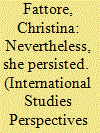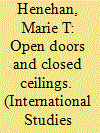| Srl | Item |
| 1 |
ID:
164640


|
|
|
|
|
| Summary/Abstract |
The Women's Caucus for International Studies and the ISA Committee on the Status of Women conducted a survey of the membership concerning the effects of gender on members’ professional and personal lives in November and December 2015. Other iterations of this survey using similar questions were conducted in 1995 and 2006. A plurality of women and a majority of men responded that things have gotten better for women in the discipline. However, using more specific questions and asking for open responses, the survey uncovered that men and women still have very different experiences within the discipline and that the chilly climate continues to persist in international relations. The 2015 survey reveals continued concerns regarding the tension between familial responsibilities and the academic environment, overt and structural discrimination, and the perception of “reverse discrimination” against men.
|
|
|
|
|
|
|
|
|
|
|
|
|
|
|
|
| 2 |
ID:
092393


|
|
|
|
|
| Publication |
2009.
|
| Summary/Abstract |
In 1995, the Gender Research Committee of the International Studies Association conducted a survey of the membership concerning the impact of gender on members' lives. In 2006, the Women's Caucus for International Studies sponsored a follow-up survey utilizing similar questions. A comparison of the findings of the two studies shows increased representation of women within international studies, persistent frustration with the slow pace of progress in women's access to senior positions and in accommodating family issues, some evidence of a chilly climate for women and a leaky pipeline, and significant differences between men's and women's perceptions of the status of women in the profession. The 2006 survey reveals a marked increase in concerns regarding the tension between women's family responsibilities and the academic environment, identification of structural discrimination, and concerns that men have been disadvantaged by affirmative action for women.
|
|
|
|
|
|
|
|
|
|
|
|
|
|
|
|